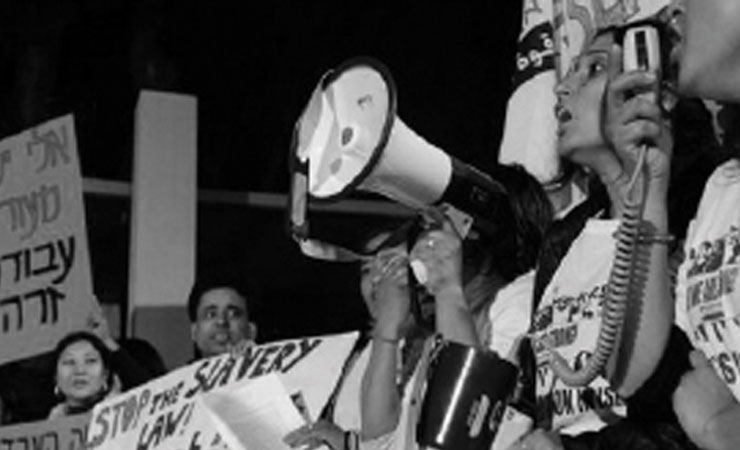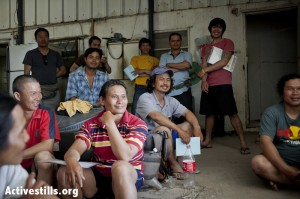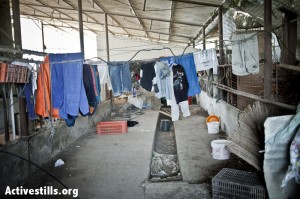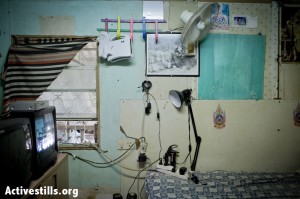Kav LaOved arrived at the small village, Warburg, after receiving various complaints from workers who were not receiving minimum wage and decent living conditions. We arrived at the village in the afternoon after the workers had finished their work day. We met with a group of them at their living quarters in the backyard of their employer’s villa. Other workers from the area also arrived at the living quarters to learn about their rights and receive help. Overall, we met with about 40 workers employed by 11 different employers.
A number of the workers told us they were getting a net salary of 3,000 shekels a month for 200 work hours, no matter which day of the week they worked. According to our calculations, they were receiving about 120 shekels a day for 8 hours of work, including Saturdays and holidays. The workers had never received salary stubs and as a result could not check their monthly salaries. Some of the workers told us that they were working 16 hours a day, and yet, were being paid 120 shekels for 8 hours, receiving only 18 shekels for every additional hour. The workers complained about their salaries and requested we help them attain their right for minimum wage. In addition, the workers had never opened a bank account in Israel. When workers have no bank account they cannot check whether they are receiving the correct salary each month. In these cases, employers succeed in manipulating salaries and social rights workers are meant to receive.
The various farms that we visited at Warburg grew different fruits according to the season. One of the biggest farms grew pomegranates which are picked especially for the Jewish holiday, Rosh Hashanah. Due to the increased demand for pomegranates during the season, the workers were forced to work additional hours. Amidst the extra work hours and the terrible heat the workers could only take a 30 minute break in the afternoon.
All 40 workers described how they sprayed different chemicals for pest control on the fruit 3 times a week on average. Despite the frequent use of pesticides, the workers never received any protection (according to law) or formal training on how to work and protect themselves from such chemicals. Some of the workers told us that they would feel dizziness after working with the pest control. The workers had no health insurance cards, and no details regarding health insurance.
The second most frequent complaint from the workers was regarding their living conditions. After hearing their complaints, we walked around some of the living quarters. The first set of living quarters was where the workers greeted us, practically a storage room with added concrete that held 9 workers. The workers had one toilet and a shower. The kitchen was hardly connected to the building and about to cave in. The workers bedrooms were cramped and very small. In some of the rooms there was not even enough room to separate one mattress from another on the floor. And of course there were no dressers or cabinets with locks in any of the rooms for clothing or personal items. There was not even locks on any of the doors. In the second set of living quarters the situation was much worse. They looked like they were built for temporary use- the bathrooms and showers were falling apart and fungi had spread throughout the entire floor. It was impossible for the workers to shower. The workers told us that they had tried to speak with the employer about the moisture and rotting but the employer refused to take action. The third living quarters exposed the workers creativity in finding ways of coping with the fact that they had no kitchen. The workers created something similar to a kitchen outside the quarters where they cooked all day in any season. Its important to note that the kitchen could be extremely hazardous both to the workers and their quarters.
When we were talking with the workers, we were badgered at by the employer even though we were in the workers quarters, which they pay for each month. The rest of the day we were at the central garden of the village, and there we continued to gather information about their lives, their complaints, and spoke of ways to act.
Like every other village we have visited, the main complaint from the workers was that they were not being paid minimum wage and receiving decent living conditions. We passed on their complaints to the relevant institutions and remain committed to ending their exploitation and informing them of their rights.





